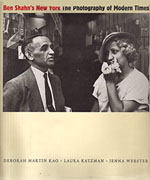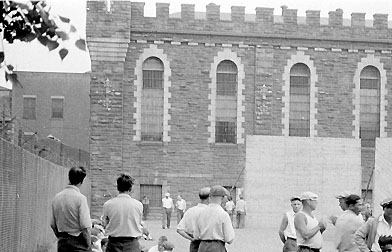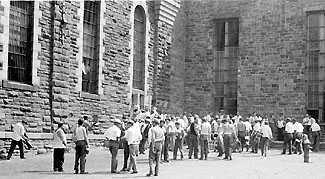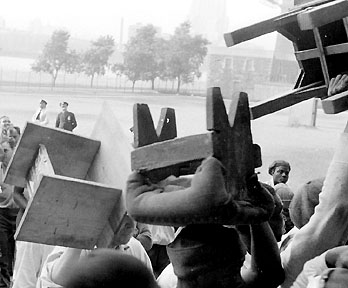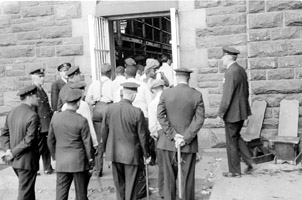Originally from the collection of the Margaret M. Bridwell Art Library, University of Louisivlle, that, while retaining all rights, granted NYCHS permission to post excerpts from memorandum material appearing in
"Ben Shahn's New York: The Photography of Modern
Times" Exhibition Catalogue [284 - 285]:
Lou Block & Ben Shahn Memorandum
to LaGuardia on Murals for Rikers
Island Penitentiary
. . . . At the beginning of research and after conversations with
Commissioner [Austin H.] MacCormick, Dean [George W] Kirchwey, Mr.
[William B.] Cox, [executive secretary] of Osborne Association, and Warden
[Lewis E.] Lawes, we abandoned the idea of dealing with the history of
penology. We felt that the murals would have more force if they treated
only with prisons of our own time, both of an unenlightened nature and
those which have been administered by individuals who believe in the need
for penal reform.
The corridor for which these murals are intended is about 100 feet long
by 18 feet wide and the available space for painting above a tiled dado is
about 12 feet. As you enter the corridor facing toward the chapel
entrance, the left hand wall deals with those prisons which are still
administered under methods which leave very little to which the inmate can
look forward. In the sketches which you have, this wall begins with a cell
block indicating the filing cabinet nature of this type of institution.
This permits no possible chance for individual treatment or
rehabilitation, of the prisoner. It is also intended to indicate the
overcrowded unsanitary conditions which exist in these prisons.
. . . The succeeding panels on this wall carry through the different
types of penal institutions and methods which have not encountered the
influence of reform. The chain gangs of the South, institutions in which
no work is provided for the inmates, and a survey of similarly
unenlightened institutions are portrayed. . .to help you identify the
various panels, the following list gives you the order in which they will
appear:
- Police line-up
- Cell block in an unsanitary prison
- Idleness and the miffing of prisoners
- Public whipping
- Dreary, unproductive labor
- Southern prison camps
- Prisoners after 5 o'clock in their cells
- Overcrowded, unsanitary dormitories
- The restrictions on visiting, with a metal screen between prisoner
and visitor
- The release of the prisoner and an intimation of a return to crime
The wall over the chapel entrance contains a symbolic figure of Thomas
Mott Osborne pointing the way toward proper prison methods. . . The long
right hand wall contains the positive activities of institutions which are
administered under more enlightened methods. The introduction into prisons
of schools for illiterates, facilities for teaching trades with well
equipped shops and civilian instructors, outdoor recreation, and work
under healthful conditions are shown on this wall. . . .
The wall over the exit door is to contain an apotheosis of both walls.
Existing conditions such as the difficulties facing a man released from
prison; unemployment; the hostility of the public to an ex-convict; and
similar circumstances make any summation hard to arrive at.
What we would like to suggest is the possibility of a full realization
of reform direction as it affects a convict both in prison and after his
release, reacceptance without stigma by society, the opportunity for
employment, and a general readjustment calculated to prevent a return to
crime. This wall is still in a tentative state, however, and we are hoping
in additional talks with Commissioner MacCormick to develop this theme to
its most logical form.
We would also like to point out that these murals are not directed to
the inmates of the penitentiary but, in accordance with the plan of
Commissioner MacCormick, are intended to visualize for visitors,
especially visiting penologists and students of sociology, the problems
which have been set forth in this series of murals.
[NOTE: The full text can be found in the Ben Shahn's New York: The Photography of Modern Times Exhibition Catalogue from which the above was excerpted. NYCHS appreciates being permitted to post these exhibition materials excerpts. Harvard College President and Fellows retain the copyright and reserve all the rights thereunder. For more, including the larger original digital versions -- between 100Kb and 600Kb -- of the images shown here much reduced, visit Harvard University Art Museums' Ben Shahn at Harvard. To order, visit Yale University Press and use 0300083157
as the ISBN search term.]
|
